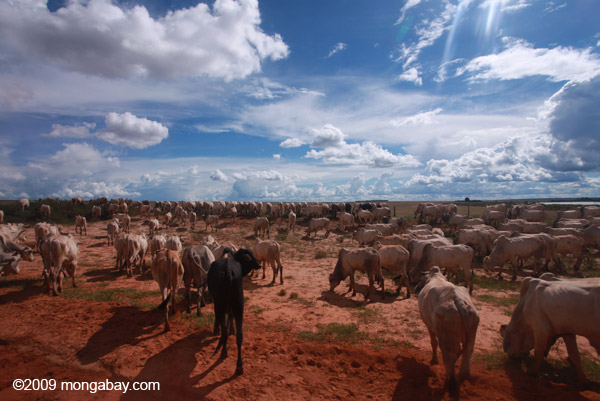By Julia Airey
Staff Writer
South America is one of the world’s largest beef suppliers, a fact that comes as no surprise to Europeans familiar with restaurants such as Argentinian steakhouses. What is less well known is the tremendous environmental havoc that the beef industry has been wrecking in Latin America.
For many years now, rapid deforestation has been brought about by ranchers trying to make room for increasingly larger herd sizes brought about by rising market demand. However Brazil, one of Latin America’s biggest beef producers, has recently begun facing pressure from environmental groups. Such groups include supermarket coalitions who refuse to stock meat from ranchers who practice unsustainable cattle raising techniques. However, pressure for change has been met with resistance, as the ranchers constitute a valuable aspect of Brazilian culture. And ultimately, with the beef industry generating $6 billion annually (about 70% of the Bazil GDP) and employing nearly 30 million people the industry is not one Brazil can necessarily afford to impede.
Yet, the ingenious actions of American ex-patriot cowboy John Carter are proof that compromises between the needs of an immensely profitable industry and those for environmental preservation can be reached.
Formerly a Texan cowboy, Carter now resides in Brazil where he presides over the organization he founded, the Aliança da Terra (AT). Situated in Mato Grosso, the area is described as “lawless frontier territory.” The area is made up of delicate Amazonian rainforests, which are being affected by some of the most damaging ranching practices. AT has mustered more than 500 ranchers and farmers to use the arable land as efficiently and as sustainably as possible.
Today AT holds an impressive 30,000 square kilometers of land – the same size as Belgium- and designates half of that to be protected rainforest. The organization’s budget has risen into the millions and is being used to further develop methods for better use of the land as well as support the local communities. This ranges from employing local natives, with extensive knowledge of the land, to assist firefighters in protecting the endangered forest from soil erosion and river pollution.
AT is currently working on developing incentives for its members to continue such laborious efforts. One of the most popular ones includes creating a label that would designate their beef and crops as high-end products with superior taste that were created through the respectful use of the land. Carter hopes incentives like this label will help AT retain its current members, as well as promote the organization’s groundbreaking work in re-writing the role of the cowboy in modern times.
Julia Airey, class of 2015, is a Law and Linguistics major from Ashby, Massachusetts, United States.

